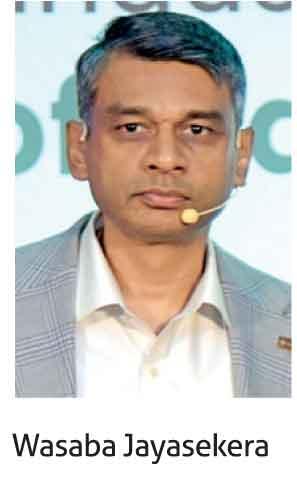08 Feb 2024 - {{hitsCtrl.values.hits}}

Panel discussion. From left: Nalalaka Senevirathna (CEO – Eco Spindles Pvt Ltd), Ramesh Nanayakkara (Senior Director & General Manager – Ansell Lanka), Pushpika Janadheera (Managing Director – Dipped Products PLC), Dr. Dilan Fernando (General Manager Research & Innovation – MAS Holdings), Rohan Goonatilleke (MD/CEO - Hayleys Fabric PLC) and Prashani Illangasekara (Moderator)
Pix by Samantha Perera
By Ishan Sheriffdeen
 With Sri Lanka generating over 900 metric tons of plastic waste daily, of which only 5 percent is recycled, the majority ends up in landfills or unregulated dumps. Such plastic waste enters waterways, eventually finding its way into the ocean, impacting aquatic and marine life, and contaminating food chains that affect both land animals and humans.
With Sri Lanka generating over 900 metric tons of plastic waste daily, of which only 5 percent is recycled, the majority ends up in landfills or unregulated dumps. Such plastic waste enters waterways, eventually finding its way into the ocean, impacting aquatic and marine life, and contaminating food chains that affect both land animals and humans.
As such, plastic pollution is one of the key environmental challenges for the present generation and there is no feasible alternative for plastic at the moment, a top forum in Colombo highlighted recently.
According to Hayleys Aventura, government awareness programmes on this subject are totally inadequate.
“Awareness plays a big role. When there is awareness, the so-called wastage, over-design of products, over-design of processes can be managed. From a regulatory perspective, the regulators must understand the sustainability of materials such as paper, wood, ceramic, glass, plastic etc before imposing laws and regulations, Wasaba Jayasekera, the Managing Director of Hayleys Aventura (Pvt) Ltd told Mirror Business.
He urged the government, industry, academia, civil society and scientists to have a wider conversation about plastic, research on the science of the product, assess its usage across industries. He noted it is essential to look at how some of the developed countries are tackling the issue and then drive a meaningful, scalable solution.
“It’s essential to jointly formulate a policy or standard procedure. The convenience, versatility and cost-effectiveness of plastic have transformed industries and people’s daily lives. If there is a viable alternative we can adopt it; else we have to manage with the product that we have by reducing the consumption of the material (plastic) lining-up the manufacturing process of a given product,” said Jayasekera, speaking on the sidelines of the inaugural ‘Congress for Sustainable Materials 2024’, an industry forum on the ‘Future of Plastics & Packaging’.
Sri Lanka has the bio-degradable, recycling and reuse solutions. It has the technology. What it critically needs is public awareness to bring about a change through behavioural and technological means.
When there is awareness, it will be possible to categorise each material as sustainable, unsustainable and in between. Many people do not know whether plastic is bio-degradable. Many people think that paper is sustainable than plastic, which is not the case. Paper degrades fast, but that does not mean it is sustainable, explained Jayasekera.
“At Hayleys Aventura, we recognise our responsibility to lead the charge toward sustainable practices. This inaugural Congress for Sustainable Materials 2024 serves as a platform to foster collaboration, innovation, and a collective commitment to practical, sustainable solutions.”
The Congress showcased two distinguished panels, each representing industries such as Agriculture, Food, Packaging, Textiles, and Gloves in Sri Lanka. The event garnered participation from over 80 companies spanning diverse sectors, with attendees also hailing from Bangladesh, the USA, and the Maldives. Furthermore, a global audience engaged with the proceedings through live streaming, amplifying the event’s reach and impact.
A new study by Zero Waste Europe, Searious Business, and National Hawker Federation (NHF) has found that, in Kolkata alone, transitioning about 80,000 street food vendors to a reusable system, would reduce plastic waste by more than 86 percent; create more than 2,250 jobs; and give a return on investment of 21 percent and a payback period of 2.3 years.
06 Jan 2025 18 minute ago
06 Jan 2025 28 minute ago
06 Jan 2025 57 minute ago
06 Jan 2025 1 hours ago
06 Jan 2025 1 hours ago